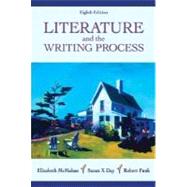
Note: Supplemental materials are not guaranteed with Rental or Used book purchases.
Purchase Benefits
What is included with this book?
| Literature and the Writing Process, 8th Edition | |
| Contents by Genre Thematic | |
| Preface | |
| Composing: An Overview | |
| The Prewriting Process Reading for Writing James Joyce, Eveline Who Are My Readers? Analyze the Audience Prewriting Exercise Why Am I Writing? Reasons for Writing Prewriting Exercise What Ideas Should I Use? Reading and Thinking Critically Discovering and Developing Ideas Self-Questioning Directed Freewriting Problem Solving Figure 1-1 Directed Freewriting Clustering What Point Should I Make? Figure 1-2 Clustering Relate a Part to the Whole How Do I Find the Theme? Stating the Thesis | |
| The Writing Process How Should I Organize My Ideas? Arguing Your Interpretation The Elements of Good Argument Building an Effective Argument Arranging the Ideas | |
| Checklist for Arguing an Interpretation Developing with Details Questions for Consideration Maintaining a Critical Focus Distinguishing Critical Comments from Plot Details How Should I Begin? Postpone If Nothing Comes Write an Appealing Opening State the Thesis How Should I End? Relate the Discussion to Theme Postpone or Write Ahead Write an Emphatic Final Sentence Composing the First Draft Pausing to Rescan Quoting from Your Sources Sample Student Paper: First Draft Suggestions for Writing Ideas for Writing Ideas for Responsive Writing Ideas for Critical Writing | |
| The Rewriting Process What Is Revision? Getting Feedback: Peer Review Revising in Peer Groups | |
| Peer Evaluation Checklist for Revision What Should I Add or Take Out? Outlining After the First Draft Making the Outline Checking the Outline Sample After-Writing Outline Examining the Sample Outline Outlining Exercise What Should I Rearrange? Does It Flow? What Is Editing? What Sentences Should I Combine? | |
| Transitional Terms for All Occasions | |
| Revising Checklist Combining for Conciseness Sentence Combining Exercise Rearranging for Emphasis and Variety Varying the Pattern Exercise on Style Which Words Should I Change? Check Your Verbs Exercise on Word Choice Use Active Voice Most of the Time Use Passive If Appropriate Exercise on Passive Voice Feel the Words Attend to Tone Use Formal Language What Is Proofreading? Try Reading It Backward Look for Your Typical Errors | |
| Proofreading Checklist Read the Paper Aloud Find a Friend to Help Sample Student Paper: Final Draft | |
| Researched Writing Using Library Source in Your Writing Conducting Your Research Locating Sources The Online Catalog Indexes and Databases | |
| Selected Online Indexes and Databases Using the Internet | |
| Internet Sources for Literature Evaluating Online Sources Reference Works in Print | |
| Selected Reference Works in Literature Working with Sources Taking Notes The Printout/Photocopy Option Summarizing, Paraphrasing, and Quoting Devising a Working Outline Writing a First Draft Organizing Your Notes Using Quotations and Paraphrases Integrating Sources Quoting from Primary Sources Avoiding Plagiarism Rewriting and Editing Documenting Your Sources Revising the Draft | |
| Checklist fo | |
| Table of Contents provided by Publisher. All Rights Reserved. |
The New copy of this book will include any supplemental materials advertised. Please check the title of the book to determine if it should include any access cards, study guides, lab manuals, CDs, etc.
The Used, Rental and eBook copies of this book are not guaranteed to include any supplemental materials. Typically, only the book itself is included. This is true even if the title states it includes any access cards, study guides, lab manuals, CDs, etc.